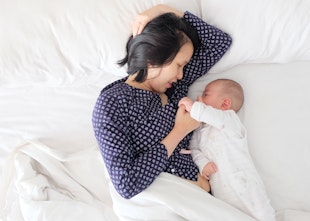Co-sleeping is when babies or young children sleep in close proximity to their parents. It may be one or both of the parents and it tends to be directly connected to the child’s senses. Their sense of smell, touch and taste tells them that you are close by and as a result, they settle better in that environment.
Co-sleeping is when babies or young children sleep in close proximity to their parents. It may be one or both of the parents and it tends to be directly connected to the child’s senses. Their sense of smell, touch and taste tells them that you are close by and as a result, they settle better in that environment. For many parents, co-sleeping is a survival mechanism that derives from simply recognising that everyone in that particular family gets more sleep this way.
There are many other
benefits to co-sleeping. For example, breastfeeding at night can feel more manageable as your baby is in close proximity to you. It can also reduce separation anxiety.
There is quite a bit of scaremongering that comes with the topic of co-sleeping. The internet is full to the brim with images and anecdotes that highlight the dangers of co-sleeping. In reality co-sleeping has been around forever and is the norm in many cultures. The last thing a parent should be faced with is another reason to worry when sleep deprivation can already make the world feel like a dark place. However, there are some really important factors to consider when you are
co-sleeping. There are some important safety guidelines to follow if you decide to co-sleep with your child. As always it is important to seek advice from your PHN or GP if you have any concerns but here are some of the most important safe co-sleeping guidelines.
- Use a cellular blanket to keep your baby warm rather than a duvet. Ensure that blankets and bedding stay away from your baby’s face.
- It is recommended that you should not co-sleep with your baby if your partner smokes even if they do not smoke during the hours that they are at home.
- You should not co-sleep with your baby if you or your partner have consumed alcohol or drugs. This includes prescription medications that make you drowsy.
- You should ensure that your baby is put to sleep on their back rather than on their tummy or side.
- Do not place your baby on a pillow. Babies do not require a pillow until they are one year of age. Ensure that they are not close by your own pillow also.
- Do not co-sleep on a couch, sofa or recliner. They are soft and have cushions than an infants head can slip between easily. They are also elevated off the ground and there is a risk of them falling.
- Make sure that there are no gaps around the sleep surface where your child could become wedged. The surface should be a firm mattress with a well-fitted cotton sheet.
- It is suggested that the baby should sleep beside the mother rather than in the middle of the bed. That is due to the fact that mothers have a greater sensitivity and awareness of the baby in the bed.
- Ensure that the room is cool enough to maintain your baby’s body temperature. Sleeping close to you will naturally raise it. Dressing your baby in an outfit that does not require them needing a blanket can also help.
- Do not allow small children to sleep in the same bed as a small baby. Small children do not have the same awareness of tiny babies as parents do and it can make the bed an unsafe sleeping environment for your baby.






